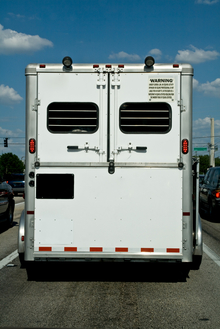Veterinary surgeons are being urged to add their names to an open letter to the EU Commission asking it to heed the scientific evidence that shows horses suffer on long distance journeys to slaughter and for other journeys for fattening and sale, and to introduce a short, maximum journey limit.

Setting limits on horse transport
Veterinary surgeons are urged to add their names to an open letter to the EU Commission asking it to heed the scientific evidence that shows horses suffer on long distance journeys to slaughter.
Veterinary nurses and student vets are also being encouraged to add their name to the letter which is available at the World Horse Welfare website.
World Horse Welfare and its veterinary advisors have produced the letter as part of their campaign against the long distance transportation of 65,000 horses across Europe to slaughter. The open letter will be presented to the new EU Health Commissioner, once one has been appointed, and asks the Commissioner to propose an amendment to the EU transport rules in light of scientific evidence collected by the charity and the recommendations of the EC’s own scientific advisors, the European Food Safety Authority (EFSA).
The equine charity has long collected its own evidence of horse suffering on these journeys and cites other independent scientific research as well as the recommendations of EFSA who assessed the available research and recommended a short, maximum journey limit of no more than 12 hours for these journeys.
This evidence, which in 2011 was handed to the Commission in the form of a dossier[i], demonstrates that current journey times and transportation practices cause harm to horses and pose an EU-wide disease threat, clearly underpinning the case for amending the current Regulation[ii].
“Despite recognising that ‘severe welfare problems persist’ and being presented with clear evidence showing how these horses are suffering, changes to legislation have not been proposed by the Commission,” said Roly Owers chief executive World Horse Welfare and a veterinary surgeon himself. “I therefore urge my veterinary colleagues to sign the letter requesting that the Commission make good on its commitment to policies informed by scientific evidence and introduce a short, maximum journey limit.”
Supporters who are not veterinary surgeons, students or veterinary nurses, can help by emailing Vice-President Maroš Šef?ovi? (who has been appointed as a caretaker for this area in the interim between the resignation of the last Commissioner and the appointment of a new one), from the website page above or can support the campaign by making a donation to World Horse Welfare.
